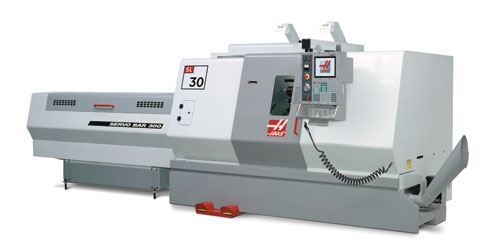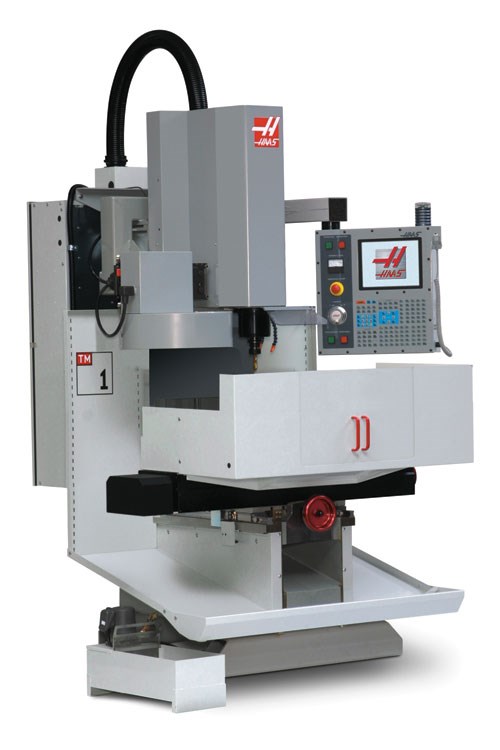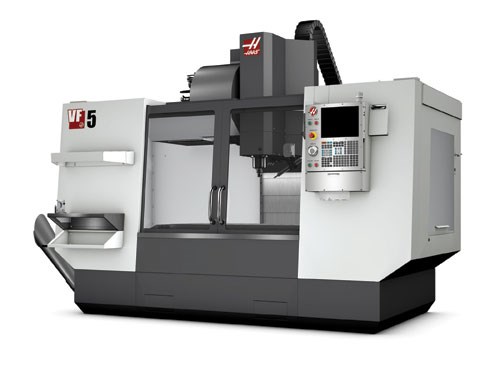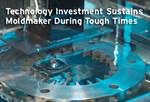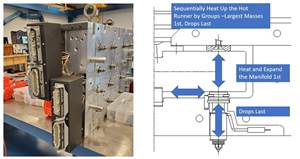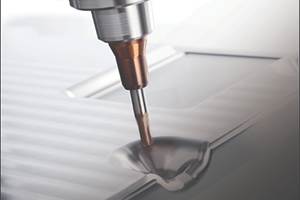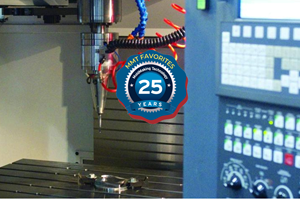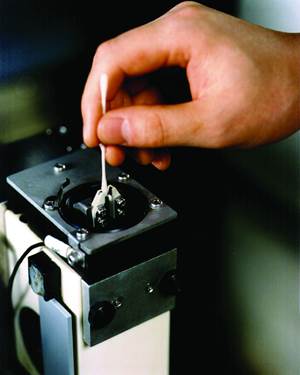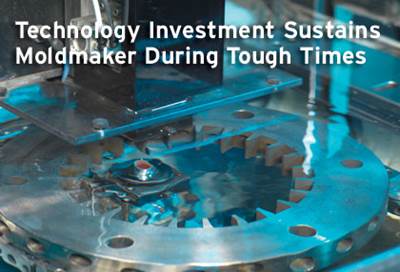Machining Centers Allow Moldmaker to Hold Consistent Tolerances/Finishes
“When the difference between success and failure, or profit and loss, can be measured in thousandths of an inch, experience is your most important asset.”
E & D Engineering Systems (Gladwin, MI) specializes in the development, design, and manufacture of molds and match-metal trim tooling for the thermoforming industry, mostly in the food packaging industry, as well as injection molds and extrusion dies. The company looks to machine tools from Haas Automation, Inc. (Oxnard, CA) to hold the tight tolerances its customers require, often ±0.001 or less.
E & D President Ed Wark notes that the company has more than 50 years of combined machining experience in every facet of design and production of molds for vacuum and injection molding of thermoplastics, thermosetting polymers and liquid silicones. The company specializes in molds for small- and medium-sized parts with unusual or difficult requirements, such as: complex geometry, close tolerances, and intricate insert molds or overmolding.
“The rapid change of product development, along with our customers’ desire to market the latest product design, requires quick turnaround of projects,” Wark notes. “Most projects require precisely machined parts that can’t always be manufactured quickly. Processing and the availability of equipment play a big role in meeting deadlines.
“All of the work we do requires very close tolerances,” Wark continues. “Few details that we machine can be allowed more than ±0.001. Our match-metal trim tools require .0002-.0004 per-side between punch and die-cutting edges. The location of dowels and bores is also critical to the assembly of our projects. Our Haas machining centers allow us to hold consistent tolerances/finishes.”
Wark notes that with the Haas machining centers, E&D has no problem holding these tolerances. When used in conjunction with SolidWorks (Concord, MA) for CAD and SURFCAM by Surfware, Inc. (Camarillo, CA) for CAM, the company prevents potential problems and produces the highest quality work.
“These systems allow us to accomplish the consistently changing 3-D geometry required for most projects,” he explains. “Quality control is important—along with producing team-based systems that are part of shop standards—so that consistency is maintained.”
“Our extensive product line— which includes a wide range of VMCs, HMCs, turning centers, and rotary products—allows us to offer solutions to meet the needs of any shop. And all Haas machines are backed by our worldwide network of Haas Factory Outlets,” notes Haas Marketing Product Manager Scott Rathburn.
“Haas VMCs feature high-performance vector drive spindles and high-torque brushless servos on all axes,” Rathburn continues. “Configurations range from 40- and 50-taper gear-driven models for high-torque, heavy-duty cutting, to super-speed models with inline direct-drive spindles to handle the most demanding high-speed machining operations.”
Haas also offers a full line of high-performance turning centers, with a wide range of high-productivity capabilities, such as dual spindles, driven tooling with C axis, and Y axis models. “All Haas machines are also available with the Haas Intuitive Programming System, a proprietary conversational programming system that makes set-up and operation easy—even without knowledge of G-code,” Rathburn adds.
“Haas has made it affordable for the average entrepreneur to get into moldmaking,” Wark affirms. “I started working by myself with a TM-1 Toolroom Mill in my garage. I paid about $20,000.00 for the machine, then added a tool changer and a fourth axis, which I did some complex geometries and surfacing on. Within six months, I bought the VF-2 with a 10,000 rpm spindle; and now we are in a 16,000-square-foot building, with five Haas machining centers and two Haas lathes with bar feeders. We use the 50-taper machines for the higher metal removal, and the 40-taper, high-rpm machines for finishing—although we do some roughing on the 40 tapers and surfacing on the 50-taper machines.”
Additionally, the Haas machines allow E & D to perform lights-out machining. “This is very cost-effective for us as well as our customers,” he comments. “This helps us to stay competitive, and have more machines than operators. It also helps us complete projects in a timelier manner.”
Wark believes that Haas technology has majorly contributed to customer satisfaction—and repeat business. “We have very little downtime or problems with the machines, and most of the time, through phone support through the Hass Factory Outlet (HFO), we can fix them ourselves,” he says “When the difference between success and failure, or profit and loss, can be measured in thousandths of an inch, experience is your most important asset."
Related Content
The Ins and Outs of Hot Runner Temperature Control
A training checklist that explains the why and how of proper hot runner temperature control and system management.
Read MoreMoldmakers Deserve a Total Production Solution
Stability, spindle speed and software are essential consideration for your moldmaking machine tool.
Read MoreMachine Hammer Peening Automates Mold Polishing
A polishing automation solution eliminates hand work, accelerates milling operations and controls surface geometries.
Read MoreMaintaining a Wire EDM Machine
To achieve the ultimate capability and level of productivity from your wire EDM on a consistent, repeatable and reliable basis, regular maintenance is a required task.
Read MoreRead Next
Technology Investment Sustains Moldmaker During Tough Times
When the mold manufacturing industry was affected by the downturn in the economy several years ago, injection mold and die manufacturer Lens Tool and Mould Ltd.
Read MoreAre You a Moldmaker Considering 3D Printing? Consider the 3D Printing Workshop at NPE2024
Presentations will cover 3D printing for mold tooling, material innovation, product development, bridge production and full-scale, high-volume additive manufacturing.
Read MoreReasons to Use Fiber Lasers for Mold Cleaning
Fiber lasers offer a simplicity, speed, control and portability, minimizing mold cleaning risks.
Read More
